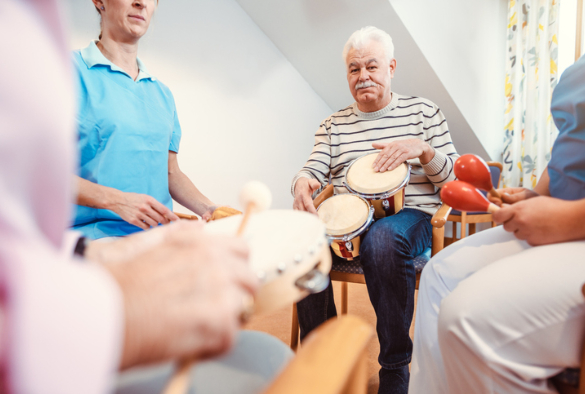COVID-19 social support cuts harming wellbeing of people with dementia

Closures to vital support services, such as day care centres and support groups, have taken a huge toll on the mental wellbeing of people with dementia and their carers during the coronavirus pandemic, new research confirms.
The ARC NWC research is the first to quantify how the pandemic has impacted social support service availability, and to explore this impact on the lives of people affected by dementia across the UK.
Across the UK, over 850,000 people currently live with dementia, with carers providing an estimated £13 billion of unpaid care a year.
Findings from a UK-wide survey carried out between April and May 2020 show that access to support services dropped following the introduction of coronavirus public health restrictions and that this change was linked to increased levels of anxiety in people with dementia, and lower levels of mental wellbeing in unpaid carers.
Lead researcher Dr Clarissa Giebel, a Research Fellow at the University of Liverpool, said: “Our research highlights the significant negative impacts that service closures are having on the lives of those affected by dementia. It is not viable to take away vital care any longer, and policy guidance needs to address how activities and day care could be restarted based on individual circumstances in relation to COVID-19 risks and balancing them with the benefits of social support measures.”
In a separate series of in-depth interviews, unpaid carers reported having to pick up increased care hours as a result of support service closures. They also expressed worry and concern about when these services would re-open, and whether their loved ones would be able to return.
Dr Giebel said: “Access to social support services, such as day centres, is crucial for the wellbeing of those who care for people with dementia. The coronavirus lockdown meant that these opportunities were suddenly taken away, leaving many carers providing 24/7 care and struggling to adapt.
“Furthermore, the benefits of care services cannot be substituted by a phone call from the day care centre or a Zoom meeting, so there has been no easy way to meet this important need.”
The researchers are now calling for more practical and psychological support for people living with dementia and their carers during the ongoing public health restrictions.
“Given that the pandemic is going to remain an issue for the foreseeable future, with various degrees of imposed and re-imposed public health restrictions, we recommend policy makers adapt social support services to refine the offer to boost accessibility of care and support for vulnerable groups with high needs; of which people living with dementia and their carers are a large proportion.”
The Liverpool researchers worked with collaborators at UCLAN, Lancaster University, University of Bradford, and University College London to conduct the UK-wide survey.
A large number of ARC NWC members and front-line care support providers supported the project, including Mersey Care NHS Trust, North West Boroughs NHS Trust, Lancashire & South Cumbria NHS Trust, Tide Carers, The Brain Charity, National Museums Liverpool, SURF Liverpool, Lewy Body Society, Liverpool and Wigan Dementia Action Alliance, Sefton Older People’s Forum, and Me2U Day Care Centre.
Research reference
Giebel, C., et al. A UK survey of COVID‐19 related social support closures and their effects on older people, people with dementia, and carers. Int J Geriatr Psychiatry. https://doi.org/10.1002/gps.5434
Giebel, C., et al. Impact of COVID-19 related social support service closures on people with dementia and unpaid carers: a qualitative study. Aging & Mental Health. https://doi.org/10.1080/13607863.2020.1822292
(pic credit: Getty/University of Liverpool)